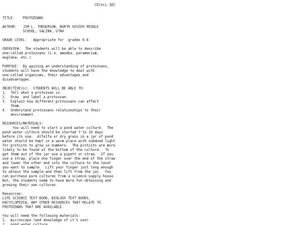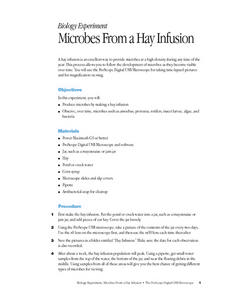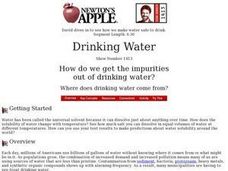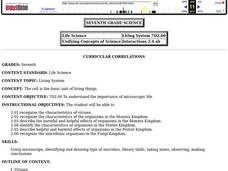Curated OER
Protozoans
Students examine protozoans and their advantages and disadvantages. In this chemistry lesson students explain what a protozoan is then draw and label one.
Curated OER
Microbes From a Hay Infusion
Students observe, over time, microbes such as amoebas, protozoa, rotifers and insect larva. They create a hay infusion culture using pond water then sample and record organisms found over a two week period.
Curated OER
PARAMECIUM RESPONSES TO STIMIULI
Students design the test they use to examine, how the paramecium move, feed, and react to different types of stimuli such as a drop of vinegar. They conduct a lab experiment using a microscope.
Curated OER
The Physiological Tolerance of Two Species of Protozoans
Students examine the differences in pH tolerance between the two species and relate these differences to their respective niches.
Curated OER
Endosymbiosis: A Friend Within
Students research the ecological principle of symbiosis. Using a microscope, students observe the relationship of mutualism between termites and flagellates. Students examine a live termite and protozoans. They discuss the principles...
Curated OER
Still Waters
Students construct a still to turn seawater into drinking water. They estimate the cost of distilling it. They investigate ways to make the conversion more efficient. They track the source of their home drinking water and make a map of...
Curated OER
One Bad Apple Spoils the Bunch
Students complete a science experiment on apples to learn about bacteria and the spread of viruses. For this germ experiment lesson, students follow a 10 step procedure to complete a study on viruses in apples.
Curated OER
Microorganism Multiplication
Sixth graders explore biology by viewing video clips in class. In this microorganism identification lesson, 6th graders identify the types of organisms that can feed small animals such as algae and protozoans. Students view video clips...
Curated OER
Week 3: Pollution Source and Effects
Lab groups set up an experiment to observe what happens over time in collected pond water when fertilizer, representing pollution, is added. This website does not include student lab sheets, but background information, materials, and...
Curated OER
Interpreting Paleoenvironments With Microfossils
Students gain a better understanding of how scientists can use foraminifera to interpret past environments. Specifically, students have the opportunity to explain one of the basic tenets of geology - the present is the key to the past.
Curated OER
Plankton / Phytoplankton
Students discuss the importance of plankton in the ocean ecosystem. In this biology lesson, students identify the different types plankton by observing them under the microscope. They explain how plankton population affect global climate.
Curated OER
Carnivorous Plants
Pupils examine how carnivorous plants get their nutrients from animals. In this food web lesson students examine how the plants attract their prey and are given many onilne sources to research.
Curated OER
Classy
Students explore the classification system in this seven lessons unit. The diversity of life forms and their characteristics are examined using a microscope. Kingdoms, classes, and families are investigated.
Curated OER
Cells
Seventh graders look up pictures of viruses or pictures of models of viruses. Using pipe cleaners, beads, Styrofoam or other available materials make models of these shapes. They then observe a demonstration to show the effect of Tobacco...
Curated OER
Composting in Schools: Observing Compost Microorganisms
Students explore composting. In this composting lesson, students use compound microscopes to observe the microbial communities in compost. Observations and documentation of changes will occur over the course of several weeks.
Curated OER
What's in Our Woods?
Students observe their local forest and document the change that occurs over the school year. For this forestry lesson, students utilize a GPS to mark a certain area of the woods as their study area for the remainder of the year....
Curated OER
Comparative Embryology Using Japanese Medaka Fish
Students conduct an experiment to control the breeding of Japanese Medaka fish. They collect the fertilized eggs and view and record the fish's embryological development daily to compare the stages to human development.
Other popular searches
- Pathogenic Protozoans
- Protozoans Slides
- Pond Water Protozoans
- Protozoans Digestion
- Protozoans Dgestion
- Protists the Protozoans
- Information on Protozoans
- Pathogens Protozoans


















